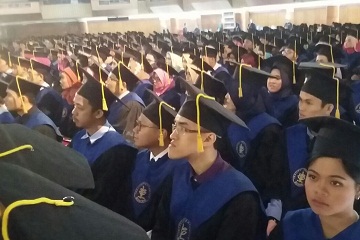Graduation in this Month of the Alumni of IPB Totaled 144,402 People

Bogor Agricultural University (IPB) was again graduating its best graduates in an open session with a single event of Graduation and Diploma Delivery of Phase VIII in the Academic Year of 2016/2017, Wednesday (26/7), in Grha Widya Wisuda (GWW), Campus of IPB Dramaga, Bogor. At this graduation stage, IPB submitted the diplomas to 691 graduates, consisting of 35 graduates with Doctoral degree, 217 graduates with Master of Science degree, 34 graduates with Master of Management and Business degree, 10 graduates with Professional Master degree, 52 graduates with Veterinarian degree, and 343 graduates with Bachelor degree.
The graduation was opened directly and led by the Rector of IPB, Prof.Dr. Herry Suhardiyanto. On behalf of all academic communities of IPB, the Rector congratulated the graduates on the successful completion of the education. He said, the graduates of IPB should be ready to face the challenge, one of the challenges that we were and would be facing was the issue of the agricultural competitiveness. The trade cooperation schemes, which were regional like ASEAN Free Trade Area (AFTA), China-ASEAN Free Trade Area (CAFTA), ASEAN Economic Community, and which was global provided a challenge on how to improve the competitiveness of the agricultural sector. Therefore, IPB as one of the leading universities in Indonesia always had a high commitment to produce the innovation that was useful for the nation and the country.
In the nine consecutive years i.e. from 2008 to 2016, IPB had always been the most prospective innovation contributor in Indonesia according to the assessment of the Ministry of Research, Technology, and Higher Education together with the Business Innovation Center (BIC) Indonesia. The total innovation of IPB in that period was 359 innovations from 936 innovation of Indonesia, the most if compared with other universities and research institutions.
Therefore, IPB had set the research agenda which included the food, the energy, the ecology, the poverty alleviation, and the biomedicine. With that research agenda, IPB could be more easily directing the research theme, so it was converging to generate the useful innovation and policy recommendation in providing the solution for various national problems.
In March 2016, the international rating agency of QS announced that IPB became one of the 100 best Universities in the world of the version of QS World University Ranking by Subject i.e. the Agriculture and the Forestry. In 10 August 2016, IPB got the Intellectual Property Award in 2016 from the Minitry of Research, Technology and Higher Education for the categories of the Productive Intellectual Property Achievenment Center Award and the Foreign Researcher Cooperation Award.
“On this occasion, I would like to convey that in the annual roadmap of the Strategic Plan of IPB, 2017 is the Year of the Mainstraiming of Agriculture. In this year, we need to further optimize the basic capital which has become the excellence of IPB for this, i.e. in the form of the innovation, the superior educated human resources, the relevant scientific substance, and the excellent academic studies in the field of agriculture in a broad sense,” said the Rector.
On this occasion, the Rector said that lately Indonesia was being intensively-incessant to enhance the values of Pancasila and Bhineka done in the anti-radical movements. For this, it had been followed by the average of all public universities (PTN) and private universities (PTS) in the form of the statement of attitude, declaration, reflection, concert, or other form of activities in order to strengthen our commitment to rekindle the spirit of Bhinneka Tunggal Ika, to practice Pancasila, to implement the Constitution of 1945, and to keep Negara Kesatuan Republik Indonesia (NKRI) / Unitary State of the Republic of Indonesia. All leaders and all campus residents of PTN and PTS committed to taking an active role in preventing the radicalism.
Other than that, which was not less important was the occurrence of the pest attack that occured in the area of Subang especially Cipunagara was quite alarming, where four seasons of the brown planthopper pest attacked until the yield was not maximal. The problems of the brown planthopper that occurred almost evenly in the agricultural area, the plants did not grow even threatened to be puso because this attack was followed by virus. IPB was through the Plant Clinic to participate in assisting in the activities of the services and the farmer assistance to overcome this problem. IPB presented the complete equipment to the control guidance of leafhopper and virus and the biological control agent of Lecanucilium.
The Rector also suggested that the Alumni Association had a strategic position for IPB as an important partner in building the nation and the country in general and building IPB in particular. The alumni of IPB could continue and develop the existing cooperation for the advancement of the alma mater. Please note that up to graduation at this stage, IPB had had 144,402 alumni. (Awl)


